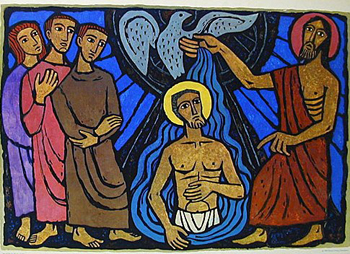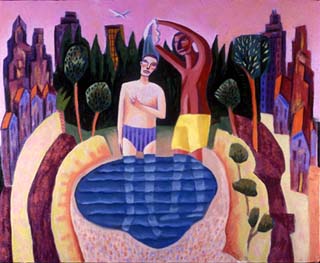From Our Archives
Dan Clendenin, The "Great Wind" of God (2015) ; and Debie Thomas, Wild Water (2021)
For Sunday January 7, 2024
Lectionary Readings (Revised Common Lectionary, Year B)
Genesis 1:1–5
Psalm 29
Acts 19:1–7
Mark 1:4–11
This Week's Essay
At church last Sunday a friend asked me a loaded question — when did Jesus the man become Christ the messiah? At what point did he become fully aware that he was the Son of God? You could make a good case that it was at his baptism and temptation in the gospel of Mark for this week.
In the movie The Last Temptation of Christ (1988), based upon the novel by Nikos Kazantzakis, the director Martin Scorsese portrays a very human Jesus. He confesses his sins, he fears insanity, he wonders if he's merely a man, and he anguishes over the people that he didn't heal.
In his "last" or ultimate temptation, during his execution Jesus battles a hallucination sent by satan. He wonders what his life might have been like if he had chosen the path of an ordinary person. He imagines marrying Mary Magdalene, growing old, and having kids. But then his disciples rebuke him for abandoning his messianic mission, and through their reproach he returns to consciousness to accomplish his final suffering, death, and resurrection.
Many Christians were outraged by Scorsese's film and considered it blasphemous. Blockbuster Video (remember them?!) even refused to carry it. What bothered many Christians was the suggestion that Jesus was fully and truly human, that he was a person who experienced trials and temptations, faults and failures, just like we do — torment, doubt, loneliness, questions, fantasies, confusion, despair, erotic dreams, and, in his final hours, feeling abandoned by God.
 |
Our impulse to air brush the humanity of Jesus has a long history. The second-century gnostics and docetics (from the Greek word dokeo, "to seem or appear") argued that Jesus only "seemed" human. Surely he couldn't have been polluted by our material existence, with all our distracted thoughts, disordered loves, and unruly desires!
Similarly, even a hundred years after the event, Jesus's baptism made some Christians nervous. In the non-canonical Gospel of the Hebrews (c. 80–150 AD), he seems to get baptized to please his mother, not to repent for his sins like everyone else: "The mother of the Lord and his brothers said to him, 'John the Baptist baptizes for the forgiveness of sins; let us go and be baptized by him.' But he said to them, 'In what way have I sinned that I should go and be baptized by him? Unless, perhaps, what I have just said is a sin of ignorance.'”
But when we try to "protect" Jesus from a genuine human nature, we actually do the exact opposite of what he himself does. In his baptism in the Jordan River and temptation in the Judean desert, instead of separating and insulating himself from us, he fully embraces and participates in our humanity.
Jesus's baptism inaugurated his public ministry. The gospel of Mark describes how "the whole Judean countryside and all the people of Jerusalem" flocked to John's baptism. So did Jesus. He identified himself with the faults and failures, the pains and problems, of all the broken people who had gathered at the Jordan River. By wading into the waters with them, he took his place with us.
 |
Not long into his public mission, the sanctimonious religious leaders derided Jesus as a "friend of gluttons and sinners." They were more right than they knew.
But none of this comes close to the biggest bombshell of the baptismal story — the stupendous claim of a trinitarian confession. Jesus's baptismal solidarity with broken people was confirmed by God's affirmation and empowerment. Still wet with water after John had plunged him beneath the Jordan River, Jesus heard a voice and saw a vision — the declaration of God the Father that Jesus was his beloved son, and the descent of God the Spirit in the form of a dove.
The vision and the voice punctuated the baptismal event. They signaled the meaning, the message and the mission of Jesus as he went public after thirty years of invisibility — that by the power of the Spirit, the Son of God embodied his Father's unconditional love for all people everywhere.
His temptation by satan similarly emphasizes his full humanity and identification with us. The parallel passages in Matthew and Luke specify three temptations: turning stones to bread, throwing himself down from the temple, and accepting the glories of earthly kingdoms. Interpreters have variously categorized these three temptations. I like Henri Nouwen's suggestion that they represent our perennial temptations to be relevant, spectacular and powerful (see In the Name of Jesus).
These were not Jesus’s only temptations. In Luke's version, at the end of the forty day trial, satan left Jesus only “until an opportune time” (Luke 4:13). He came back again and again those next three years. Like us, there was never a time in his life when Jesus didn't experience trial and temptations.
 |
|
Temptation in the Desert, 15th-century France.
|
Jesus was tempted not only in the desert but throughout his entire earthly life: "For we do not have a high priest who is unable to sympathize with our weaknesses, but we have one who has been tempted in every way, just as we are — yet was without sin. Let us then approach the throne of grace with confidence, so that we may receive mercy and find grace to help in our time of need” (Hebrews 4:15-16, NIV). His ultimate temptation, and the ultimate despair that anyone can experience, was his feeling of having been forsaken by God in Gethsemane.
Having been baptized in the river among crowds of people, then tempted in the lonely solitude of the desert, Jesus is one of us. One of the more remarkable characterizations of Jesus in the gospels is that he was “a friend of tax collectors and sinners” (Luke 7:34). We read how social and moral outcasts flocked to Jesus, much to the chagrin of the religiously righteous. They clearly felt safe with Jesus, accepted, embraced, and welcomed by him. As the friend of sinners who suffered trials and temptations, “he is able to help those who are being tempted” (Hebrews 2:18). He is for us, not against us.
When I was at Oxford University in the fall of 2003, one Sunday I attended Saint Aldates Church. No one knows for sure who Saint Aldates was, but their first rector, Reginald, started serving the church in 1226. As I walked through the church doors, the usher enthusiastically greeted me, “We welcome all sinners!" Those were liberating and comforting words that I needed to hear. They capture the meaning of Jesus's baptism and temptation: ”I have not come to call the righteous, but sinners” (Mark 2:15-17). Indeed, “this man welcomes sinners and eats with them.” (Luke 15:2).
Weekly Prayer
Henry Vaughan (1621–1695)
Unfold! Unfold! Take in His light,
Who makes thy cares more short than night.
The joys which with His day-star rise
He deals to all but drowsy eyes;
And, what the men of this world miss
Some drops and dews of future bliss.Hark! How His winds have chang’d their note!
And with warm whispers call thee out;
The frosts are past, the storms are gone,
And backward life at last comes on.
The lofty groves in express joys
Reply unto the turtle’s voice;
And here in dust and dirt, O here
The lilies of His love appear!Henry Vaughan, a Welsh poet and physician, was born in Llansanffraid, where he lived for most of his life and was eventually buried. Vaughan studied at Oxford, but never took a degree, and then moved to London where he studied law for two years. He underwent a spiritual awakening that he credited to the poetry of “the blessed man, Mr. George Herbert.” Vaughan was married twice and fathered eight children.
Dan Clendenin: dan@journeywithjesus.net
Image credits: (1) Third Way Living by Ken Corder; (2) James B. Janknegt, Brilliant Corners ArtFarm; and (3) The Metropolitan Museum of Art.





